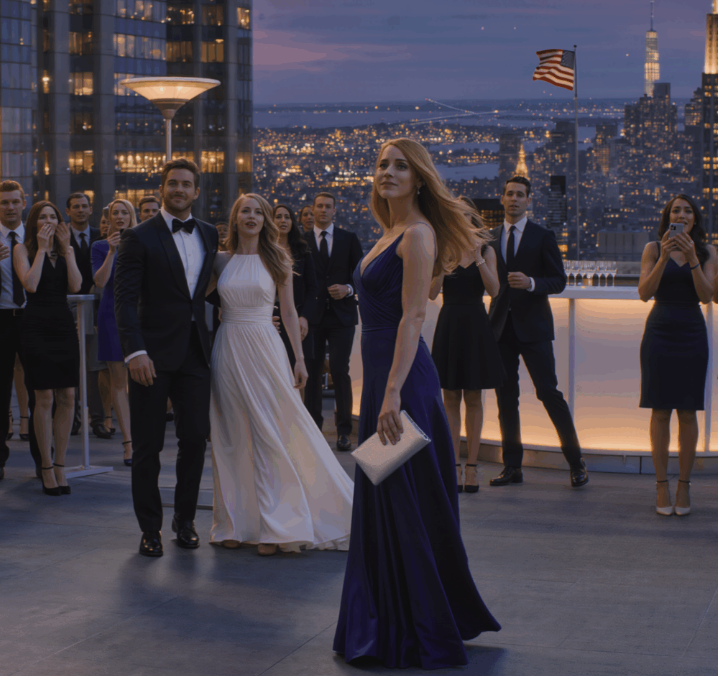His fortune isn’t self‑made.
It’s just very, very well laundered.
The event’s MC, a local news anchor with teeth too white for real life, hands Logan the microphone. I hold my crystal flute of champagne—$300 a bottle—and fight the uneasy twist in my gut.
Logan taps the mic. The awful amplified thump echoes across the rooftop.
He lifts his glass and beams.
“Thank you all for coming,” he says. “Tonight isn’t just about giving back to this great city. It’s about a new beginning.”
A new beginning.
Wrong phrase. Not the one we rehearsed last night.
A cold ripple runs up my spine. I glance at him. He isn’t looking at me. He’s looking into the shadows by the stage.
“And in the spirit of new beginnings,” he continues, “I want to share a very personal one.”
He extends his hand.
Not to me.
Out from the shadows steps a very young woman. Twenty‑five at most. She wears a white dress—an aggressive white, bridal white—that absorbs every spotlight.
Her face is sculpted by fillers, perfected for cameras.
I recognize her instantly.
Naomi Hart. A lifestyle influencer whose brand revolves around “authenticity” and wellness sponsorships.
Flashbulbs explode. Pop—pop—pop.
Logan pulls her close, his arm tight around her tiny waist. He looks into the cameras, then finally looks at me.
“I’d like you all to meet Naomi,” he announces. “My new wife.”
Silence. A vacuum. Three hundred elite guests freeze in place.
Then the whispers.
Phones rise—every guest capturing the moment for their feeds, futures, or gossip circles.
They capture the brutal triangle:
Logan—the triumphant husband.
Naomi—the upgraded replacement.
Me—the discarded original.
My body detaches. My ears ring, but my vision sharpens. I see pity on junior associates’ faces, triumph on the faces of women who always envied my house, my wardrobe, my husband.
They are waiting for the spectacle.
The tears.
The screaming.
The perfect crack in the perfect hostess.
I don’t give them that.
I smooth the silk of my gown and take one step forward. Then another.
Whispers die. Cameras tilt.
I reach the stage. I raise my glass.
“Congratulations, Logan,” I say, my voice perfectly steady. “You always did love a dramatic reveal.”
His face flickers—rage breaking through his polished charm.
Naomi steps forward, mistaking my calm for surrender.
“Chloe,” she coos, extending her manicured hand. “I truly hope we can handle this with grace.”
I take her hand.
Inside my palm is a thin folded document. A copy of the prenup.
As our hands meet, I slide it into her grasp—a quiet sleight of hand shielded by the flashbulbs.
She frowns.
I lean in, lips almost brushing her ear.
“Welcome to the family,” I whisper. “He made me sign that when we married. Read it tonight before you get too comfortable. Pay close attention to Section 4, Subsection B—the part about infidelity… and asset forfeiture.”
Her eyes widen.
Fear replaces triumph.
I walk back to the railing, smiling as cameras whirl.
And in every photo that hits the internet by morning, only one person looks straight down the lens.
Only one person looks like they just won.
Maple Ridge, the town I grew up in, is a million miles away from this rooftop. A working‑class place flattened by humidity in the summer and wet snow in the winter.
Harper Lane—my cousin, my age, the golden child—was the family’s investment, their future. She got the cheerleading uniforms, the summer camps, the expensive jeans.
I got whatever was on sale at Sears.
When I asked to join the debate team, my mother sighed.
“Chloe, honey, we just don’t have the emotional energy for more running around right now.”
I wasn’t mistreated.
I was omitted.
I was “the one who caused no trouble.”
Being no trouble is a slow erosion. You learn to take up less space until you believe you have no right to exist.
Dinners in our cramped house were loud, tense battles about money.
Love wasn’t love.
Love was collateral.
And I learned early: people—especially family—will sell you out and call it protection.
My refuge was the Maple Ridge Public Library. I devoured legal textbooks, corporate structures, wills, estates. Words on a page became armor.
I vowed I would never again sign something I didn’t fully understand.
My grandmother Eleanor was the only one who truly saw me.
“You’re different, Chloe,” she told me once. “One of our girls won’t sell herself for money. She’ll learn to make money serve her. That’ll be you, bird.”
When she died six months later, her small life‑insurance policy wasn’t enough for the family’s new roof.
But she hadn’t left it to them.
She left it to me.
A tiny educational savings account—a key.
High school magnified the divide. Harper dated boys with lake houses. I worked at the Daily Grind café, listening to lawyers talk about partnerships, liabilities, and escrow.
I scribbled down every unfamiliar term.
The collapse came during a family fight over a payday loan my father had taken out. He sat at the table, beaten, whispering he didn’t know what to do.
My mother looked at me and said:



Yo Make również polubił
Moja siostra wyśmiała mnie, że jestem technikiem i powiedziała swoim znajomym prawnikom, że „nawet nie chodziłem na studia”. Potem wyrzuciła mnie z Święta Dziękczynienia. Ale kiedy jej szef wstał i zapytał: „Czekaj… twoja siostra to Fiona Anderson?”, co powiedział potem…
Jak Rozpoznać Narcyza Manipulatora? 3 Kluczowe Oznaki
Cukierki maślane
Po tym, jak rodzice wyrzucili mnie z domu w Boże Narodzenie, użyłam starej czarnej karty mojego dziadka – a kierownik banku zamarł, gdy zobaczył moje nazwisko na ekranie tego śnieżnego poranka w Burlington w stanie Vermont. Zaledwie kilka godzin wcześniej stałam boso na ich ganku, ściskając worek na śmieci zamiast walizki, przechodząc od „córki Carrington” do „dziewczyny śpiącej w samochodzie” ze 182 dolarami na koncie, podczas gdy mówili mi, że nigdy bez nich nie przeżyję.